#riki wilchins
Text
happy pride reccing some anti-assimilationist, anti-capitalist, and abolitionist books and texts
BOOKS
Why Are Faggots So Afraid of Faggots? edited by Matilda Bernstein Sycamore (2012)
"Whatever happened to sexual flamboyance and gender liberation, an end to marriage, the military, and the nuclear family? As backrooms are shut down to make way for wedding vows, and gay sexual culture morphs into "straight-acting dudes hangin' out," what are the possibilities for a defiant faggotry that challenges the assimilationist norms of a corporate-cozy lifestyle?"
Transgender Liberation: A Movement Whose Time Has Come by Leslie Feinberg (1992)
This pamphlet is an attempt to trace the historic rise of an oppression that, as yet, has no commonly agreed name. We are talking here about people who defy the ‘man’-made boundaries of gender.
Transgender Warriors: Making history from Joan of Arc to Dennis Rodman by Leslie Feinberg (1996)
[Leslie Feinberg's] book celebrated the resistance to transphobia and a vision of trans liberation articulated from the perspective of class struggle. It understood that no liberation from transphobia or any of the divisive and violent oppressions in class society is possible without the transformation of capitalism into socialism.
The Faggots & Their Friends Between Revolutions by Larry Mitchell (1977)
Stories told of these times make the faggots and their friends weep. The second revolutions made many of the people less poor and a small group of men without color very rich. With craftiness and wit the faggots and their friends are able to live in this time, some in comfort and some in defiance.
Also this interview
Gender Outlaws: The Next Generation edited by Kate Bornstein, and S. Bear Bergman (2010)
Today's transgenders and other sex/gender radicals are writing a drastically new world into being.
Made In India: Decolonizations, Queer Sexualities, Trans/National Projects by Suparna Bhaskaran (2004)
Made In India explores the making of "queer" and "heterosexual" consciousness and identities in light of economic privatization, global condom enterprises, sexuality-focused NGOs, the Bollywood-ization of beauty contests, and trans/national activism.
That's Revolting: Queer Strategies For Resisting Assimilation edited by Matilda Bernstein Sycamore (2008)
As the growing gay mainstream prioritises the attainment of straight privilege over all else, it drains queer identity of any meaning, relevance or cultural value.
How To Blow Up A Pipeline by Andreas Malm (2021)
Malm argues that sabotage is a logical form of climate activism, and criticizes both pacifism within the climate movement and "climate fatalism" outside it.
On Connection by Kae Tempest (2020)
On Connection is medicine for these wounded times.
Are Prisons Obsolete by Angela Y. Davies (2003)
If you know anything about Angela Davis—anti-racist activist, Marxist-feminist scholar—you know that her answer to the question posed in the title is "Yes." This is a short primer on the prison abolition movement
Becoming Abolitionists: Police, Protests, and the Pursuit of Freedom by Derecka Purnell
This profound, urgent, beautiful, and necessary book is an invitation to imagine and organize for a less violent and more liberatory world.
Black Marxism by Cedric Johnson (1983)
Influenced by many African American and Black economists and radical thinkers of the 19th century, Robinson creates a historical-critical analysis of Marxism and the Eurocentric tradition from which it evolved. The book does not build from nor reiterate Marxist thought, but rather introduces racial analysis to the Marxist tradition.
The Transgender Issue: An Argument For Justice by Shon Faye (2021)
[Shon Faye] provides a compelling, wide-ranging analysis of trans lives from youth to old age, exploring work, family, housing, healthcare, the prison system and trans participation in the LGBTQ+ and feminist communities, in contemporary Britain and beyond.
Burn The Binary: selected writings on the politics of being trans, genderqueer, and non-binary by Riki Wilchins (2017)
This single volume offers a selection of Riki’s most penetrating and insightful pieces, as well as the best of two decades of Riki’s online columns for The Advocate never before collected, from "Where Have All the Butches Gone," to "Attack of the 6-Foot Intersex People"
ARTICLES
Assuming The Perspective Of The Ancestor by Claire Schwartz (2022)
Philosopher Olúfẹ́mi O. Táíwò on building constructive, future-oriented politics, at scale.
The Gender Binary Is A Tool For White Supremacy by Kravitz Marshall (2020)
A brief history of gender expansiveness - and how colonialism slaughtered it
Meet Chris Smalls, the man who organized Amazon workers in New York By Anna Betts, Greg Jaffe, and Rachel Lerman (2022)
The fired worker and former rapper did what nobody else has done in the U.S.
The Nuclear Family Was A Mistake by David Brooks (2020)
The family structure we’ve held up as the cultural ideal for the past half century has been a catastrophe for many. It’s time to figure out better ways to live together.
Universal basic income seems to improve employment and well-being by Donna Lu (2020)
Extinction Isn’t the Worst That Can Happen by Kai Heron (2021)
"This brings us to the third problem with eschatological framings of the climate crisis: they overlook the fact that for many, the end of the world has already happened. In October last year, Nemonte Nenquimo, a Waorani woman, mother and leader, wrote a desperate letter to the western world reminding us that for Indigenous peoples, “the fires are raging still”."
MISC
Manifesto: An Aromantic Manifesto by yingchen and yingtong
free to read
their tumblr (with further resources)
Essay: I Dream Of Canteens by Rebecca May Johnson (2019)
There is a space for everyone. A space, a glass of water, and a plug socket.* Chairs and tables and cleaned toilets. So many chairs so that no one is without one.
Acceptance Speech (video and text): The National Book Foundation Medal for Distinguished Contribution to American Letters speech by Ursula Le Guin
Hard times are coming, when we’ll be wanting the voices of writers who can see alternatives to how we live now, can see through our fear-stricken society and its obsessive technologies to other ways of being, and even imagine real grounds for hope.
And here's a video to cleanse the soul: bell hooks: Transgression
bell hooks & Gloria Steinem at Eugene Lang College
#happy pride#leslie feinberg#ursula le guin#bell hooks#kate bornstein#queer literature#trans literature#marxist literature#black literature#political lit#andreas malm#rebecca may johnson#kai heron#kae tempest#matilda bernstein sycamore#angela davies#shon faye#riki wilchins#larry mitchell#s bear bergman#Suparna Bhaskaran#derecka purnell#cedric johnson#Olúfẹ́mi O. Táíwò#chris smalls#yingchen#yingtong#if anyone has anything from outside america or the uk (there are a few but not a lot here) + more on disability activism +#more on intersex activism#i haven't read *fixing sex* yet so dunno if it fits this exact list
1K notes
·
View notes
Text
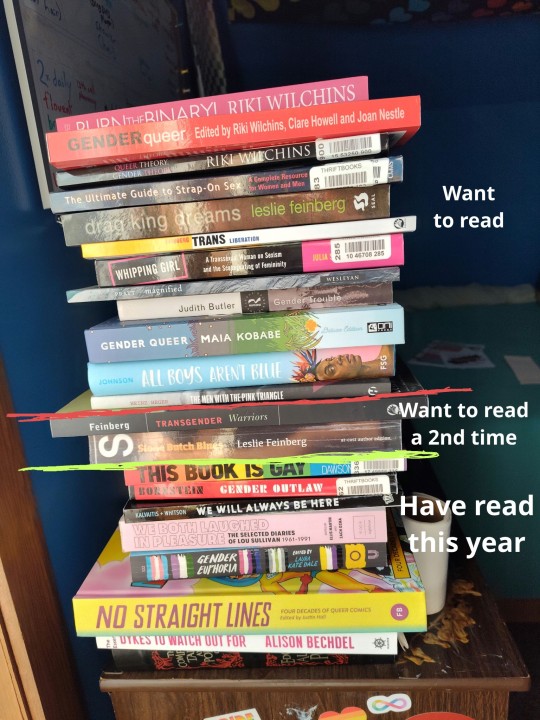
Here's how my huge stack of queer books is going
(trust me this is impressive as a dyslexic person)
Ignore the Edgar Allan Poe book it's just there to be huge n press flowers
Technically Stone Butch Blues is in both the categories (have read this year) and (want to read a 2nd time)
#trans literature#trans history#queer lit#queer literature#queer history#gender theory#queer theory#leslie feinberg#riki wilchins#stone butch blues#gender outlaw#trans#transgender#genderqueer#nonbinary#queer#books#genderqueer lesbian#lesbian#gay books#dyslexic#neurodivergent and queer#autistic and queer#special interest#thorntalksqueerly#a reading list ?
65 notes
·
View notes
Text
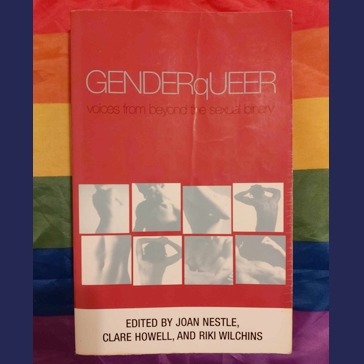
Y llyfr heddiw yw 'GENDERqUEER' a olygwyd gan Joan Nestle, Clare Howell a Riki Wilchins, a gyhoeddwyd yn 2002.
Mae'r llyfr hwn yn casgliad o draethodau rhyweddgwiar. Defnyddiwyd rhyweddgwiar yn y 1990au a'r 2000au i olygu unrhyw un yn croesi normau rhywedd - cydryweddol neu drawsryweddol, bwtsh neu ffem, wrywaidd neu fenywaidd, deuaidd neu anneuaidd - y ddau ac y naill na'r llall. Yn ddiweddar, mae'r term wedi dod yn olygu dim ond anneuaidd, ond mae'r term mewn gwirionedd yn ymbarél mawr. Mae'r traethodau'n ddisgrifio trawsnewid menyw i ddyn, rhyw lesbiaidd, menywod bwtsh, rhyw hoyw cyntaf, dysfforia rhywedd ac yn y blaen.
Dyma'r llyfr yn bwysig iawn imi - rwy'n ddyn traws ac yn rhyweddgwiar fy hun!
Ydych chi wedi darllen y llyfr hwn?
/
Today's book is 'GENDERqUEER' edited by Joan Nestle, Clare Howell and Riki Wilchins, published in 2002.
This book is a collection of genderqueer essays. Genderqueer was used in the 1990s and 2000s to mean anyone crossing gender norms - cisgender or transgender, butch or femme, male or female, binary or nonbinary - both, or neither. Lately, the term has come to mean just nonbinary, but the term is actually a huge umbrella. The essays describe female-to-male transition, lesbian sex, butch women, first gay sex, gender dysphoria and so on
. This book is very important to me - I'm a trans man and genderqueer myself!
Have you read this book?
#cymraeg#welsh#lhdt#trawsryweddol#cymblr#rhyweddgwiar#GENDERqUEER#Riki Wilchins#Joan Nestle#Clare Howell#trans essays#genderqueer pride#anneuaidd#bwtsh#ffem#abinary#nonbinary#transgender#Llyfrau Mawrth
16 notes
·
View notes
Text
“For identities like gay or lesbian or transgender to be visible and distinct, how many other complex and unnamed identities have to be silenced and erased? Does the gay, lesbian, bisexual, and transgendered movement's noun-list approach really solve any- thing? Or do we add to it each minority the dominant culture names next so it can regulate and stigmatize it?
It is not enough to have pride in our identities, or to be inclusive. It is time for us to start looking upstream and questioning how these identities were produced. How does homosexual iden- tity actually require an antecedent heterosexuality? Does an identity based on sexual or affectional or gendered practice make any rational sense? Does not our willingness to inhabit queer identities legitimize the notion that every body ought to be socially defined by its potential contribution to procreation?
I will defend anyone's wish to call themselves drag, transexual, transgender, gay, bi, tri, or quad. For me, these are not natural iden- tities but simply political categories we are forced to inhabit when we do certain things with our bodies. And it is my larger agenda to fight this cultural machinery which categorizes, stigmatizes, and then marginalizes minorities, rather than to fight for the rights of one particular category over another.”
Read My Lips: Sexual Subversions and the End of Gender by Riki Wilchins
#terfs don’t interact#read my lips#riki wilchins#don’t think i necessarily agree but it’s interesting!#queer theory#poststructuralism#postmodernism
110 notes
·
View notes
Text
[“So why have anti-democratic authoritarians seized on our tiny population as the latest red meat with which to whip up their followers against democracy and something they call “gender ideology?”
We are meaning making animals. And of all the meanings we make about the body, perhaps none is more basic than sex.
But accepting me as a woman means radically changing how you think about sex and gender
In addition, recognizing me as a transgender woman means accepting that what I say I am trumps your visual knowledge of how I may look like to you.
I’ll see it when I believe it. Seeing is believing. What you see is what you get. Our language is replete with references to how compelling visual knowledge is. It is very challenging to ask people to accept that what they see is not really what is really there.
Think about the simple shift from “pregnant women” to “pregnant people.” The very idea of “pregnant men” — virtually unheard of a few years ago — fries some people’s brain circuits.
Finally, transgender challenges feelings about sexuality. The fact is, many people are attracted to taller, stronger masculine-type bodies and/or smaller, rounder, feminine-type bodies. It’s deeply grounded in their sense of their sexuality and feelings of desire And when you swap these aesthetics around or mix them up — as happens with bodies like mine — it undermines something fundamental about their sense of sexual attraction.
This is why attack materials created by transphobes so often features bearded, hairy-chested men: a) invading the Women’s Room; b) invading girls’ sports; c) wearing dresses and high heels; or, d) invading the Women’s Room at a girls sports event while wearing dresses and high heels. Many people find such images disturbing or actually disgusting, because they the jacks the wires of their sexual aesthetics.
So as transgender people, we are not just demanding our rights: we are asking people to literally rewrite their much of their reality. And people can be noticeably, ummm…reluctant to do that. Just talk to your parents (or mine).
And of course nonbinary and genderfluid people just put all this (pun very intended) on steroids.
Most people can probably integrate the idea of women’s rights or gay rights without upsetting their world-view too much. But not so transgender. We are literally indigestible with how many people currently understand bodies and sex.
After all, violent and anti-democratic strongmen didn’t start attacking so-called “gender ideology” world-wide until transgender rights became a thing. They have learned they can capitalize and monetize the discomfort some people feel.
Which is another way of saying that transpeople — this small, underfunded, outmanned, and outgunned minority barely on society’s radar only a couple decades ago — are slowly remaking the world.
From pronouns, gender-neutral languages, and government-issued IDs to parental rights, sports, and of course bathrooms — states, corporations, and entire societies are just beginning to wrestle with what it means to disassemble the ubiquitous structures of binary gender.
They shall know us by our enemies.
Well, we are being attacked by some of the strongest, most vile strongmen on the planet. It’s not a sign of our failure. On the contrary, it’s a sign of our success.
We’ve under-estimated just how radical and world-changing our message and vision is.
They know it. It’s time we knew it, too.
Trans rights is going to change the world.”]
228 notes
·
View notes
Text
Long article but worth the read.
Some things make less sense the more you study them: the SNP’s finances, Joe Biden’s sentences… and being nonbinary.
Nonbinary is an umbrella term used to describe those people who believe they are outside the gender binary. They believe that they are neither male nor female.
When you ask nonbinaries what they mean by this, the response usually boils down to men saying they feel kinda feminine sometimes, and women saying they kinda don’t. It’s not exactly The Communist Manifesto. When you point out that some men and women have felt this way since time immemorial, without feeling the need to turn it into a political cause, nonbinary males become aggressive and nonbinary females become sulky. All of which suggests that this nonbinary LARP may require some more thought.
If, like me, you prefer to identify as non-lunatic, you might be tempted to dismiss the nonbinary phenomenon as a passing fad, like the Tamagotchi ‘egg’ toys popular among children a couple of decades ago. But there’s a difference between the idea of nonbinary and fads like Tamagotchis, especially among the young. Schools banned Tamagotchis in the 1990s because they were a distraction. This time, our public institutions, from multinational corporations to medical bodies, are actively promoting the idea that you can be neither male nor female.
Advocates themselves seem unclear as to what ‘nonbinary’ means. Some seem unsure where to draw the line between being nonbinary and being trans. The huge American LGBTQ+ charity, the Trevor Project, insists that ‘It’s important to note that not all nonbinary folks identify as trans’. But the UK’s LGBT Foundation argues that nonbinary fits under the so-called trans umbrella. This isn’t much help, however, since the trans umbrella has by now grown so huge it could be used to protect the polar ice caps.
Throughout much of the 20th century, the prefix ‘trans’ tended to be used in relation to transvestites or transsexuals. It implied a transition from one gender or sex to the other. But this started to change in the 1990s. Disappointed by the physical results of transitioning – think big-jawed, deep-voiced ‘transwomen’ and miniature, small-boned ‘transmen’ – the trans lobby started to look for a new vocabulary that might capture what it is to be neither male nor female.
Activist Riki Wilchins played a key role in the development of nonbinary. He originally came to prominence in 1991, when he co-founded Camp Trans, an annual protest against the exclusion of transwomen from the women-only Michigan Womyn’s Music Festival. In the mid-1990s, he sowed the seeds for the idea of being nonbinary by coining a new term to describe himself – namely, ‘genderqueer’.
It was a fortuitous moment for Wilchins. From the late 1990s onwards, with queer theory flourishing in universities in the UK and the US, a slew of new identities and neologisms were being turned out, from agender and bigender to demigender and genderfluid. Nonbinary started to be used by activists and academics to encompass these new identities in the 2000s. Indeed, in 2002, Wilchins co-authored the tellingly titled Genderqueer: Voices From Beyond the Sexual Binary.
It wasn’t really until the latter half of the 2010s that nonbinary moved from the spheres of academia and activism and into mainstream culture – largely because an army of idiot celebrities embraced it.
Singer Sam Smith was one such bandwagon-jumper. In 2019, he declared himself to be ‘nonbinary’ and embraced ‘they / them’ pronouns. Smith was once an attractive young gay man. In his new nonbinary guise, he has come to resemble someone forced to twerk in fishnets as a prank.
See rest of article
5 notes
·
View notes
Text



Riki Wilchins on The Crying Game (1992)
#riki wilchins#riki anne wilchins#the crying game#the crying game 1992#jaye davidson#transgender#look i have mixed feelings about the film#for obvious reasons#but parts were absolutely powerful#and these words are powerful
32 notes
·
View notes
Text
GenderQueer: Voices From Beyond the Sexual Binary edited by Joan Nestle, Clare Howell and Riki Anne Wilchins
gooodreads
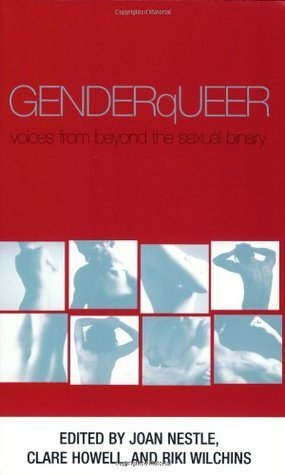
Perhaps more than any other issue, gender identity has galvanized the queer community in recent years. The questions go beyond the nature of male/female to a yet-to-be-traversed region that lies somewhere between and beyond biologically determined gender. In this groundbreaking anthology, three experts in gender studies and politics navigate around rigid, societally imposed concepts of two genders to discover and illuminate the limitless possibilities of identity. Thirty first-person accounts of gender construction, exploration, and questioning provide a groundwork for cultural discussion, political action, and even greater possibilities of autonomous gender choices. Noted scholar Joan Nestle is joined by internationally prominent gender warrior Riki Anne Wilchins and historian Clare Howell to provide a societal, cultural, and political exploration of gender identity.
Mod opinion: I haven't read this book yet, but it sounds like an interesting early trans anthology.
#genderqueer#joan nestle#clare howell#riki anne wilchins#polls#trans books#trans lit#trans literature#lgbt books#lgbt lit#lgbt literature#nonfiction#essays#anthology
4 notes
·
View notes
Text
The fight against gender oppression has been joined for centuries, perhaps millennia. What's new today, is that it's moving into the arena of open political activism. And nope, this is not just one more civil rights struggle for one more narrowly defined minority. It's about all of us who are genderqueer: diesel dykes and stone butches, leather queens and radical fairies, nelly fags, crossdressers, intersexed, transexuals, transvestites, transgendered, transgressively gendered, intersexed, and those of us whose gender expressions are so complex they haven't even been named yet. More than that, it's about the gender oppression which affects everyone: the college sweetheart who develops life-threatening anorexia nervosa trying to look "feminine," the Joe Sixpack dead at 45 from cirrhosis of the liver because "real men" are hard drinkers. But maybe we genderqueers feel it most keenly, because it hits us each time we walk out the front door openly and proudly. And that's why these pages are only going to grow. We're not invisible anymore. We're not well behaved. And we're not going away. Political activism is here to stay.
(In Your Face, 1995)
#genderqueer#f slur tw#d slur tw#eating disorder tw#alcohol tw#i love this SO MUCH you guys#i knew the 'diesel dykes and stone butches...' part of this but i also really love#'we're not well behaved and we're not going away'#shoutout to riki wilchins. love of my life#pride tag#in your face#queer history
22 notes
·
View notes
Text
When people stumble over their pronouns, stammer, blush, or apologize in embarrassment, I often think of Riki Anne Wilchins' description of her friend Holly Boswell:
"Holly is a delicate Southern belle of long acquaintance ....S/he has tender features, long, wavy blonde hair, a soft Carolina accent, a delicate feminine bosom, and no interest in surgery. Holly lives as an open transgendered mother of two in Asheville, North Carolina. Her comforting advice to confused citizens struggling with whether to use Sir or Madam is, 'Don't give it a second thought. You don't have a pronoun yet for me.’” ...
...[T]o answer the homophobes becomes easy, those folks who want to dehumanize, erase, make invisible the lives of butch dykes and nellie fags. We shrug. We laugh. We tell them: your definitions of woman and man suck. We tell them: your binary stinks.
We say: here we are in all our glory — male, female, intersex, trans, butch, nellie, studly, femme, king, androgynous, queen, some of us carving out new ways of being women, others of us new ways of being men, and still others new ways of being something else entirely. You don't have pronouns yet for us.
- Eli Clare in Exile & Pride: Disability, Queerness and Liberation (1999)
948 notes
·
View notes
Text
Very excited to read these, ever since finishing Stone Butch Blues I've been just digging for more queer literature especially on the topics of queer history and activism. 😁🏳️🌈🏳️⚧️

#queer literature#trans literature#queer history#trans#genderqueer#nonbinary#lgbt history#riki wilchins#we will always be here#burn the binary#Aqueertalksqueerly
5 notes
·
View notes
Text
Begging folks who swear by Julia Serano for the sake of winning arguments to expand your library and read Kate Bornstein or Emi Koyama or Leslie Feinberg or Riki Wilchins or yknow, Julia Serano
151 notes
·
View notes
Text
omfg i always manage to mistakingly think there is nothing left to Know that will shock me and make me reconsider concerning feminist and queer histories but oh my mother fuckin god yall DID YALL KNOW..ALISON BECHDEL SUPPORTED BI LESBIANS

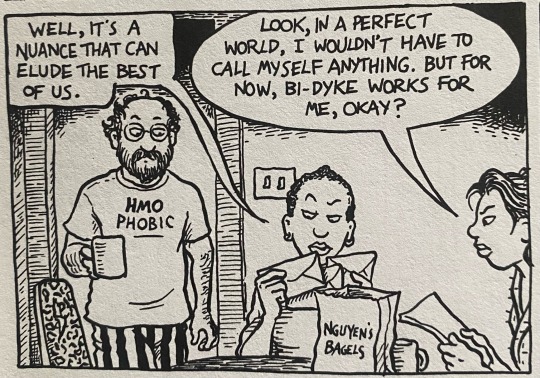

like i just hhn i wouldve had no idea i would not have even known the concept EXISTED and i, here, stand on neither side as i don't know enough about anything to make a firm point (i lean against but hearing ppl say trans women are facing the brunt of anti bi-lesbian sentiment & the strange insistence on Lesbians Cannot Like Men when trans men in lesbian history, right there-- [how can you say this without undermining trans men's manhood? i don't think you can. hence im content to describe lesbian relationships as those without cis men {though not all relationships without cis men are lesbian relationships, for ex trans gay guys or straight trans relationships} & im not one to brush aside the queer history of transmasc lesboys so easily when i know. So many very lesbian tguys] makes me reconsider)
ITS SO FUCKING NUTS TO REMEMBER THAT FEMINIST AND QUEER PPL BEFORE US ALREADY HAD THESE DISCUSSIONS ALREADY SPOKE WHAT NEEDED TO BE SPOKEN IN MANY CASES AND FORGOING THE ADVICE OF OUR FEMALE AND TRANSSEXUAL FOREBEARERS JUST LEADS US TO HAVE THE SAME POINTLESS DISCOURSES ON TUMBLR DOT COM AGAIN AND SEVER COMMUNITY OVER IT AGAIN AND AGAIN OH MY GOD ITS LIKE A CURSE ITS LIKE WE'RE SISYPHUS ALIENATED FROM OUR TEACHERS CONDEMNED TO ROLL THE SAME BOULDER UP THAT HILL
im just going fucking nuts bcauae it's always like this i will cry ahahhh like
LESLIE FEINBERG. HIR PROPHETIC STATEMENT
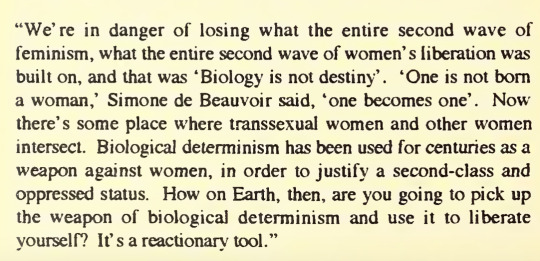
AND ITS HAPPENINGGGG ITS HAPPENING THERE ARE TERFS AND THE SEX ABOLITIONIST RADICALLY QUEER RADICAL FEMINISM OF OUR FOREMOTHERS HAS BEEN ABANDONED AND NOW NO ONE LOOKS TO THAT ESTEEMED TRADITION BESIDES A FEW BECAUSE EVERYONE HATES TERFS (rightfully so) BUT DONT KNWO THE EXTENT OF RADICAL FEMINISM UGHDHHHG OOHghhuhh OuhchhHHhn SHAKING .
AND I JUST LEARNED ABOUT RIKI WILCHINS AND THEY WERE A TRANSSEXUAL LESBIAN FEMINST!!!!! TRANSSEXUAL LESBIAN FEMINIST A BEAUTIFUL PHRASE AND NOW WERE IN AN AGE WHERE QUEER NON-LESBIANS ARE LESPHOBIC AND DAMN THE ENTIRETY OF LESBIAN FEMINISM WHILE TERFS DAMN THE ENTIRETY OF QUEERNESS AS IF LESBIANISM CAN EXIST WITHOUT IT OR TRANSNESS AND I JUST.........IDK im crying im rocking back and forth i am holding my temples those who do not know their history will be doomed to repeat it truly
#vOmignting. trhowijg UP#queer history#feminist history#transgender history#leslie feinberg#alison bechdel#lesbian history#bi lesbian#lesbian feminism#radical feminism#transfeminism#i did queer history and i didntn eveb know the daughters of bilitis im a terirble woman lover. i will be better#abourb to start sobbing just syraight up sobbing#til#my ppl are lost frfr#i am so unwell!#this is why non-white transsexual lesbians are the smartest people ever. they know what's up#they know the history because it concerns them deeply
31 notes
·
View notes
Text

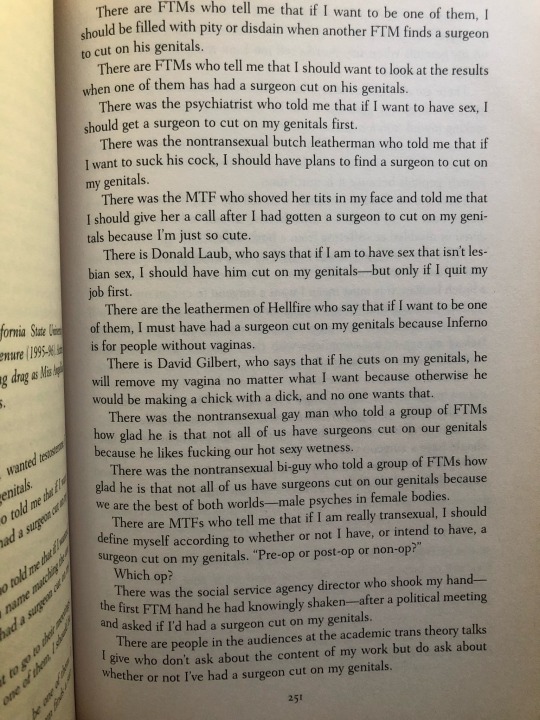
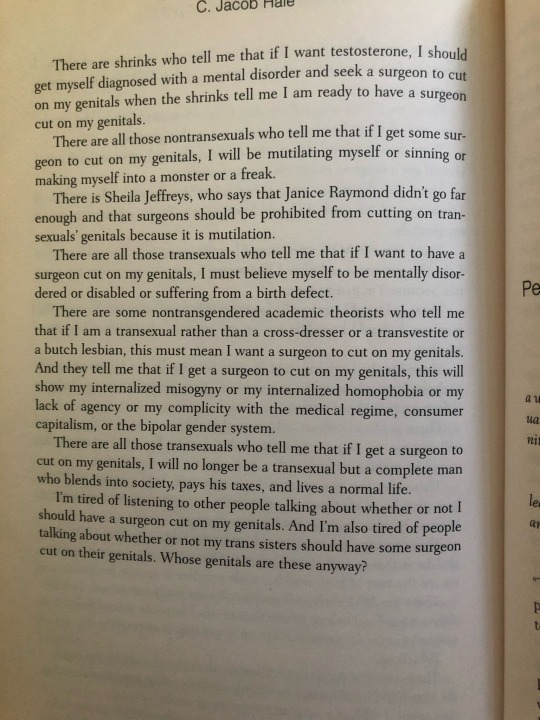
c. jacob hale, whose body is this anyway? from genderqueer: voices from beyond the sexual binary, edited by joan nestle, clare Howell, and riki wilchins, 2002
1K notes
·
View notes
Note
Hi Sex Witch! This is a book rec question, really. Do you have any recommendations you would give people who want to start reading about gender theory? I know I want to learn so much more about queer gender identity and about its cultural impact and growth in different places but I dont really know where to start because it's such a big topic to cover.
Gender related or not, thank you so much for everything you do!
god okay that's a huge ask and I don't want to just throw a bunch of super dense unapproachable text at you where you're just getting into it (Judith Butler is so good to read but they are WORK) so here's a long list of some authors you can pick and choose from
Sara Ahmed
Meg-John Barker and Jules Scheele's illustrated nonfiction Gender and Sexuality
Kate Bornstein
Ivan Coyote
Kimberlé Crenshaw
Angela Davis's book Women, Race & Class
Shon Faye
Leslie Feinberg
Cordelia Fine
Jules Gill-Peterson's book History of the Transgender Child (fairly dense read I will not lie)
Ruby Hamad's book White Tears/Brown Scars
Kit Heyam's book Before We Were Trans (haven't personally read this yet but I'm excited to)
Patricia Hill Collins
Mariame Kaba ("Makenzie she writes about prison abolition not gender" THE OPPRESSION ARE INTERLOCKING)
Mikki Kendall's book Hood Feminism
Audre Lorde (Sister Outsider is a great place to start)
Aileen Moreton-Robinson's book Talkin’ Up to the White Woman
Molly Smith and Juno Mac's Revolting Prostitutes is a BRILLIANT feminist analysis of sex workers' rights by sex workers
Amia Srinivasan's book The Right to Sex is just shakingly brilliant
Sabrina Strings' book Fearing the Black Body is a FASCINATING explanation of the formation of contemporary gendered norms and fatphobia as part of the creation of race, cannot recommend it enough
Susan Stryker
Mattilda Bernstein Sycamore
Kai Cheng Thom
Riki Anne Wilchins
Rafia Zakaria
this is obviously not a complete list please not one @ me, it's just! a place to start browsing!
28 notes
·
View notes
Text
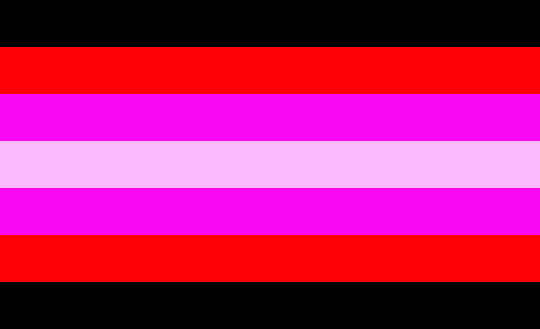
Transexual Menace
The Transexual Menace, or The Menace, was a transgender rights activist organization founded in New York City in 1993 by transgender activists including Riki Wilchins and Denise Norris, in response to the exclusion of transgender people from lesbian, gay, and bisexual Pride marches.
I made a flag using their logo, for if you, too want to be A Menace
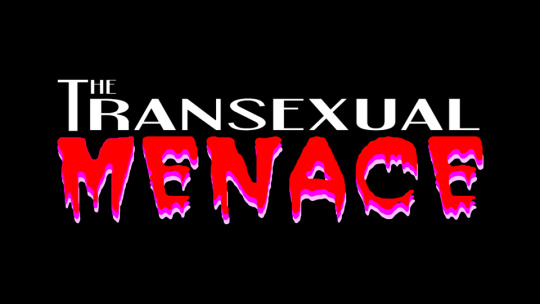
7 notes
·
View notes